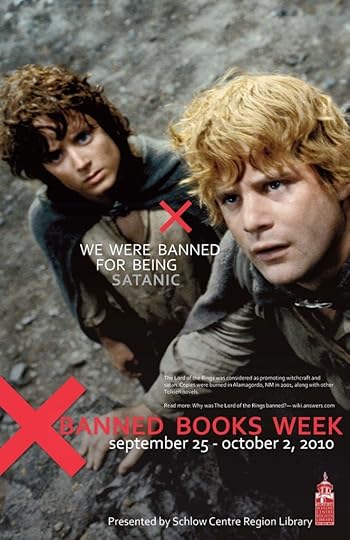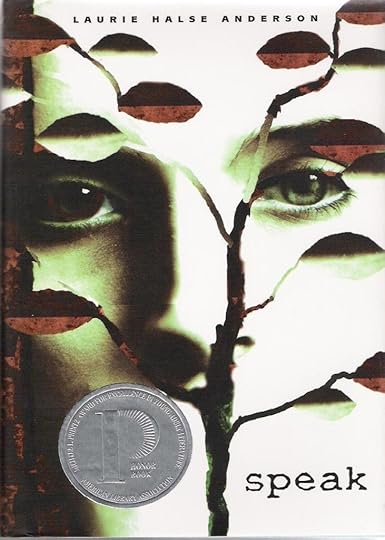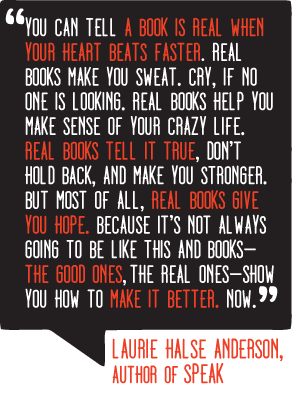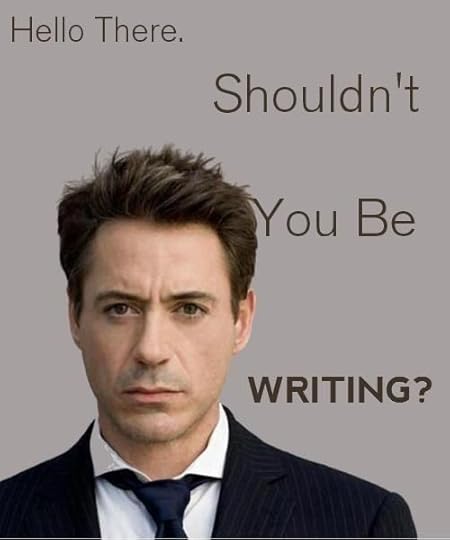Banned Books Week kicks off today which makes this a great time to discuss writing about sensitive topics. Should you think about the possibility that your book will be censored? What are your responsibilities to your readers?

When I was writing SPEAK, I never thought that it might be censored. The possibility that the book would be labeled "pornography" never entered my mind, which was good, because if I had known, I might not have had the courage to write it. I used to shy away from confrontation; just the thought of having to stand up to people saying nasty things about me was enough to make my stomach hurt.

Even though I've had many challenges to my books, when I'm writing I don't think about censorship. I do think about my readers…. but not until I am revising. Early drafts are supposed to be written in a white heat, leaving open the windows, doors and gates so that you can catch all the streams of imagination that trickle by you. But you revise with detachment and coolness. You have to fall out of love with your story so you can see the flaws clearly. You try to see the story the way a reader would. If you are writing for kids or teens, that means you take their sensibilities into account.
In early drafts, the rape scene in SPEAK was graphic. I needed to write it that way to really understand what had happened to Melinda and why she was so depressed and isolated. I put it away for a month or so, then I pulled it out and read it with a degree of detachment. I knew what had to change and why.

You see, 44% of rape victims are under age 18 and 15% are younger than 12. I wanted the book to be something that could be read by 8th graders, even 7th graders. It makes us uncomfortable to think about it, but middle schoolers are exposed to a bewildering world of sexual behavior (looking at you, Miley Cyrus) and are often very confused about what's going on, what the boundaries are, and what they should do when confronted with sexual violence.
SPEAK is told from the point of view of Melinda, who was raped at a party. The toned-down description of the assault works because it is filtered through her shock and inebriation. It also allows the focus of the reader to be on the emotional consequences of the sexual assault and Melinda's struggle to find the courage to speak up after it, which was the whole point of writing the story.
When I'm confronted by people who call me bad names or accuse me of seeking to ruin children's lives, I ask them if their school library contains newspapers. The answer is always "yes." That means that the students are exposed to pretty much everything that happens in our society, the good stuff and the horrific stuff. Books like mine seek to tell honest stories about realistic situations facing kids today.

NOTE: If you don't write realistic fiction for kids or teens, you still stand the chance of having your books challenged or banned. No matter what you write, someone will criticize you.
The top image refers to the banning of Lord of the Rings, which was accused of being "satanic." I have a friend who wrote a Halloween book that came under fire from a group of parents who were so upset they showed up in the principal's office the day she was due to present at the school. The parents weren't worried that her book was evil or satanic. They were all Wiccan and felt that my friend's book perpetuated negative stereotypes (witches with long chins and warts and pointy hats) of their faith community.
I work hard to protect our freedom to read year-round. I you want to lend your energy, there are many things you can do. But try to lock the door in your head when it comes time to work on early drafts. When revising, consider your audience, and craft the story so that you will reach them in the most effective way. If the day ever comes when your book is challenged, bake yourself a cake because you just joined a club with many distinguised authors.
Non-fiction prompt - Write a response to the people who tried to ban one of these books.
Fiction prompt - Write a scene in which a group of people with firm convictions go to a school board meeting to get a book they object to pulled from the shelves of the library. The media is out in full force, cameras are rolling, the room is split 50/50 about the challenge and the air conditioning is broken.

Fifteen minutes spent writing today could change your life.
scribble… scribble… scribble…
 newest »
newest »
 newest »
newest »
 I'm right there with you, as an 8th grade teacher, facing the same issues and struggling to find novels they want to read but which I can in good conscience promote.
I'm right there with you, as an 8th grade teacher, facing the same issues and struggling to find novels they want to read but which I can in good conscience promote.
 Katie wrote: "In college, I attended BYU (a highly religious school), and I took a theory of ethical literature class as part of my English Education degree. In an essay I wrote, I used your novel Speak as an e..."
Katie wrote: "In college, I attended BYU (a highly religious school), and I took a theory of ethical literature class as part of my English Education degree. In an essay I wrote, I used your novel Speak as an e..." That's fine, but I don't want a kid to sit and read about it in detail. That didn't strike me as a Young adult book. I am not going to ban it, but I'm just not going to promote it on my shelf. That doesn't sit well with me. That sorry of explicit sexual content does make people uncomfortable. Laurie Anderson did a great job with speak..she talked about rape without describing it in graphic detail. She even could have rescinded it a little more and I would be fine. But I just don't feel right handing a 14 year old kid a novel with sexually explicit content. That's just my opinion though, which is why I would never ban a book.
That's fine, but I don't want a kid to sit and read about it in detail. That didn't strike me as a Young adult book. I am not going to ban it, but I'm just not going to promote it on my shelf. That doesn't sit well with me. That sorry of explicit sexual content does make people uncomfortable. Laurie Anderson did a great job with speak..she talked about rape without describing it in graphic detail. She even could have rescinded it a little more and I would be fine. But I just don't feel right handing a 14 year old kid a novel with sexually explicit content. That's just my opinion though, which is why I would never ban a book.










Now as an 8th grade English teacher, I have been faced with what novels are appropriate to put on my classroom library shelf. Over my 7 years of teaching, I have become more lax about it, but there are several young adult novels that I will never put on my shelf: Novels with graphic sex scenes, rampant strong language, and novels that ultimately do not teach a moral message.
Yes, my students can and do check out novels like that at the school and public library. Yes, my students can and often do engage in strong language, lewd sexual behavior, drug use etc. However, I just do not feel comfortable putting a book on my shelf that has a graphic sex scene or rampant strong language. Just because they might be exposed to at school, not everyone is comfortable with it, and I, as an educator, have to make a choice what I want to promote. If it is on my shelf, I am promoting it. I have several of your books on my shelf, including Speak. Yes, it deals with rape, but I am so grateful you didn't describe the scene in all its gory details because then I wouldn't have felt comfortable putting on my classroom library shelf. I am so glad I do feel comfortable because that book has helped many of students with some of their own personal struggles, and it has gotten many of my reluctant readers to read a book :P
However, I have cringed at many young adult novels because of the content. I don't want to censor, ban, or seem like I am shoving my morals on someone else, but neither do I want to promote books that I feel are pornographic, do contain strong language, and do promote poor values.
This has been an issue that I have had ambivalent feelings with for a while. Should we censor/ban books? I don't know. I laugh at a lot of the books that get put on those lists? Harry Potter? Evil? That is ridiculous. The Giver? deals with suicide. Speak? deals with rape. Oh please, people, calm down. But then, there are those books that I can not believe an author dared to call a young adult novel. Yes, the youth today enjoy reading books dealing with drugs, sex, and violence, but there is a way to do it without all the gory details that make it offensive and pornographic and actually promote that sort of behavior.
--For example, I started to read The Perks of being a Wallflower because my kids were passing it around like crazy. 10 pages in, and I was completely disgusted. I tried to keep reading, but when it started describing a kid masturbating, I was done. Am I going to go and ban that book? No! But am I going to put it on my classroom library and promote it to my students? Nope!